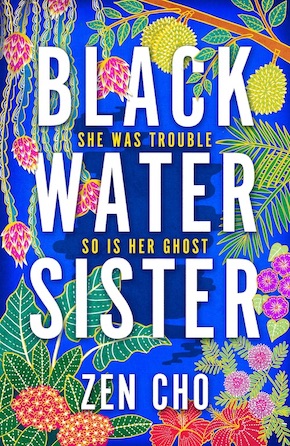Ten things about writing
by Zen Cho
“A sharp and bittersweet story of past and future, ghosts and gods and family, that kept me turning pages into the dark hours of the night.” Naomi Novik, author of Uprooted
Any writer is prey to the temptation to hand out writing advice at the least provocation, but I try to refrain most of the time. There is sufficient writing and publishing advice on the internet to equal even the cat photos and pornography. But here are ten things I believe about writing: things I tell myself when I need to hear them.
1) There are different ways to be a writer, most of which are equally valid
You don’t have to be traditionally published. You don’t have to be published in print. You don’t have to be published at all. You don’t have to write original fiction. You don’t have to write novels. You don’t have to write fiction. You don’t have to write every day.
You probably do have to write from time to time in order to be a writer. But there are a lot of different ways to be a writer, and you don’t have to do any of the other things to deserve the term.
2) The writing is the most important thing
Publishing is basically irrelevant. The problem is that it is where the attention and money comes from, so your brain is very liable to get fixated on it. However, this principle is important to believe even if you want desperately to get published, because being a writer can be depressing in lots of ways (constant rejection, nobody wants to read your stories, pay-to-effort ratio is low, writing is hard). So if you don’t find writing fun or fulfilling – something worth doing for its own sake – then things are likely to get sticky at some point.
3) Every voice is needed. Only you can write your stories
Especially for people who have been told that their voice does not matter or is not as interesting as others’, it can be easy to get discouraged and feel that there is no need to add your voice to the cacophony, because who cares? But the world needs your voice. No one else can replace you.
4) Feel the jealousy. Let it go
At some point you will feel upset at another writer’s success. It is not a rational feeling, because another writer’s success is not actually taking away from any success you might have, books not being interchangeable widgets. But it happens. Don’t worry too much about it, but don’t let it take up valuable brain space that could be filled with ghosts and talking dragons and rocket ships instead.
Make sure you have lots of eggs in different baskets, so even if the writing goes you’ll still be a person with a full, happy life.”
5) Do the hard stuff
You don’t have to publish or be a professional writer, but if you want to be a professional then it helps to act like one. I don’t mean replying to emails promptly and refraining from insulting agents (though do answer your emails and don’t insult agents), but doing things when you don’t want to do them. I do things for my day job all the time that I don’t really want to do, but that are part of my job and enable me to keep doing the parts I enjoy.
Sometimes writing will not be fun. It probably won’t be anything more than a hobby if that’s where you stop – though it is fine if you enjoy it as a hobby and don’t want it to be anything more, of course.
6) Seek balance
You shouldn’t pin all of your self-identity and self-worth on writing. It’s bad for yourself, but also it’s bad for your writing. People get tied into knots over things they can’t control – a book doing badly, a story that won’t sell. That can end up blocking them from the deep joy and nourishment writing can bring. To be a writer is to have a creative practice that is not in the gift of any publisher, corporation, employer, parent or teacher; it is to have a source of fulfilment nobody can take away from you. That’s priceless.
So this point may feel contradictory, but it’s nevertheless a good one – seek balance, so you can protect that source of fulfilment. Make sure you have lots of eggs in different baskets, so even if the writing goes you’ll still be a person with a full, happy life.
7) Take the work seriously, but not yourself
The work deserves the best of you. But people who go around talking about what tortured artistic souls they are and how unusual and interesting it is being a Writer are annoying. Think less about yourself and more about your work.
8) There are no shortcuts
Sometimes when people ask me for advice about writing or publishing I wonder if they think I have a special secret – a password I can give them that will open the doors to a world they want to enter.
I don’t. I have privileges without which I would not be where I am today (a good education, loving family, support with household chores, healthy finances). But with all the books I’ve published, I went through the same mundane process: I wrote a book, reworked it, and submitted it to a publisher. That’s pretty much what most people who sell books to publishers do. It involves a lot of hard work and rejection, but there aren’t really any shortcuts.
9) Support others
I don’t mean this in a “you scratch my back, I scratch yours” sort of way. This is different from networking. It is good for you, as an artist, to be generous – to rejoice in the success of others – to love others’ work more than your own – to give what you can to other people. It will make you happier. It will deepen your connections with other people. It is probably even good for your writing, I don’t know. But it’s valuable in itself.
10) Fill the well
Read interesting books. Look at pictures. Listen to music. Watch interesting films. Have good conversations. Watch people and listen to them. Do something new once in a while. Give your brain something to chew on so when you sit down to write, you have something to say.
 Zen Cho is the author of the Sorcerer to the Crown novels, the novella The Order of the Pure Moon Reflected in Water and a short story collection, Spirits Abroad. She is a Hugo, Crawford and British Fantasy Award winner, and a finalist for the Lambda, Locus and Astounding Awards. Born and raised in Malaysia, she resides in the UK, and lives in a notional space between the two. Her latest novel, Black Water Sister, a contemporary fantasy set in Malaysia, is published by Macmillan in hardback and eBook.
Zen Cho is the author of the Sorcerer to the Crown novels, the novella The Order of the Pure Moon Reflected in Water and a short story collection, Spirits Abroad. She is a Hugo, Crawford and British Fantasy Award winner, and a finalist for the Lambda, Locus and Astounding Awards. Born and raised in Malaysia, she resides in the UK, and lives in a notional space between the two. Her latest novel, Black Water Sister, a contemporary fantasy set in Malaysia, is published by Macmillan in hardback and eBook.
Read more
zencho.org
zenaldehyde
@zenaldehyde
Author portrait © Darren Johnson/IDJ Photography

